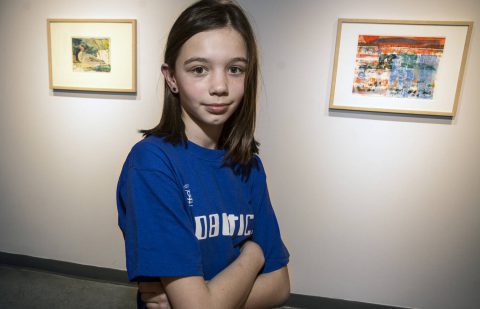In this edition of The Intern Files, we hear from Amy Weir. Amy is a library and information science graduate student from the Faculty of Information at the University of Toronto. In the past, Amy has interned at the RMG Library and Archives, and is currently working on a special project for the Thomas Bouckley Collection.
Compiled by local historian Thomas Bouckley, the Thomas Bouckley Collection at the RMG depicts the history of the City of Oshawa – providing visual insight into Oshawa’s past. The collection’s catalogued component consists of over 2280 photographs and negatives, but in addition, the RMG possesses a wide range of supporting files from Thomas Bouckley’s personal collection: over 2000 items including uncatalogued photographs, documents, artefacts and ephemera.
As some may be familiar, much of the catalogued component of the Thomas Bouckley Collection has been organized and filed in proper storage, frequently displayed in exhibitions and accessed for research purposes by the public. However, the other items that make up the collection currently remain in the condition received in 1985, with little organization, improper storage, and a lack of archival-quality housing. The uncatalogued materials, while stored in folders that have been numbered and named, are also difficult to locate due to a lack of description in the accompanying finding aid. This is where I come in. Over the course of three months, I’m working toward the goal of establishing order and appropriate storage for the uncatalogued portion, with the ultimate objective of facilitating ease of access, longevity, and ongoing preservation for the entire collection.
Re-housing files in archival-quality folders, before and after.
Currently, the project’s first stage is just wrapping up: the records within nearly all of the files have been ‘re-housed,’ and placed in archival-quality storage to enhance their preservation. Some files have simply required new, archival-quality file folders, while others have required more careful intervention – removing damaged photos from dated photo albums, for example.
Damaged photos to be removed from unstable photo albums.
Doing so has involved an analysis of every item in the collection, which has provided a great opportunity to discover the treasures that Bouckley collected as part of his research. Items, such as the original postcard with inscription shown here, tell the stories of the families who lived in early Oshawa.
1917 postcard and note on verso. Man in photo is identified as Frank Mallet of Mallet House Hotel, Oshawa.
TBC File no. 013A
What’s more, some of the items within the collection speak to not only the history of Oshawa, but the history of other areas in Ontario, with research and artefacts dating as far back as the aboriginal settlements of today’s Durham Region and Southern Ontario. Once the collection has been properly re-housed, organization and the eventual production of a digital finding aid (and collection inventory) is created, access to the collection will be significantly enhanced while contributing to Bouckley’s endeavour to continually augment and to preserve our knowledge of the region’s history.




